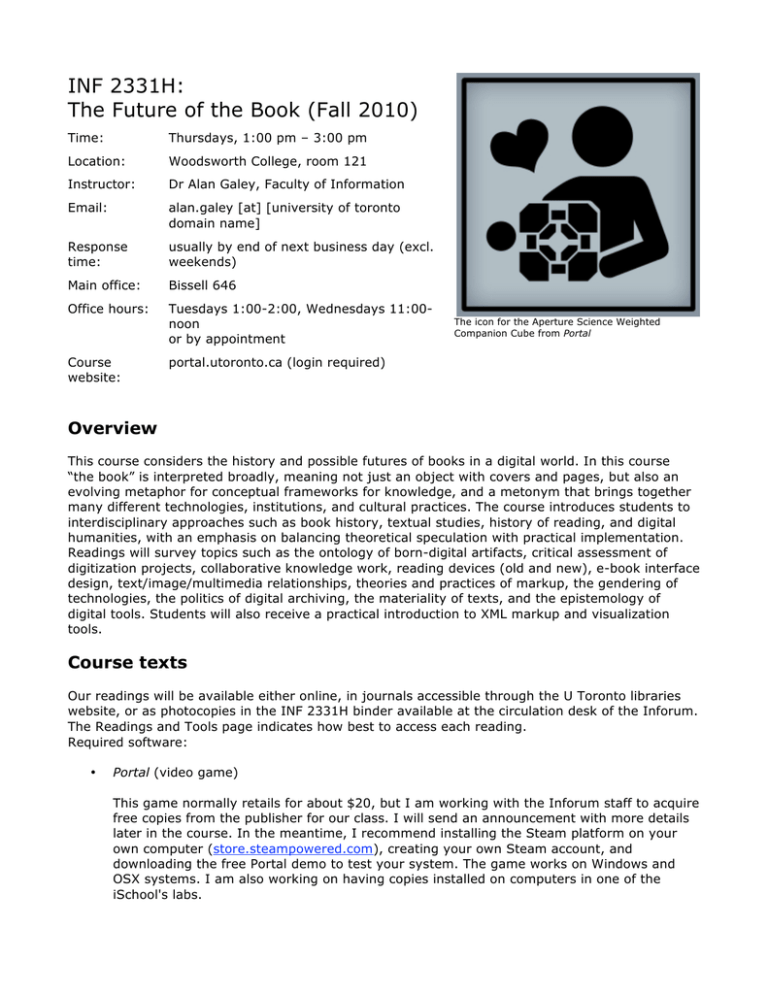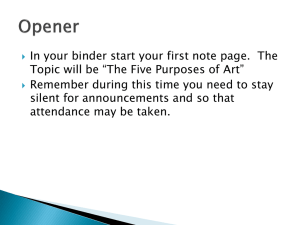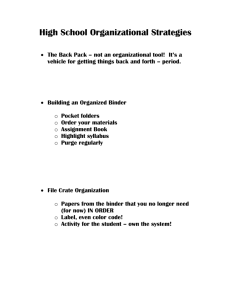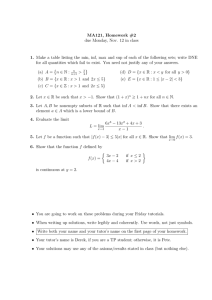INF 2331H: The Future of the Book (Fall 2010)
advertisement

INF 2331H: The Future of the Book (Fall 2010) Time: Thursdays, 1:00 pm – 3:00 pm Location: Woodsworth College, room 121 Instructor: Dr Alan Galey, Faculty of Information Email: alan.galey [at] [university of toronto domain name] Response time: usually by end of next business day (excl. weekends) Main office: Bissell 646 Office hours: Tuesdays 1:00-2:00, Wednesdays 11:00noon or by appointment The icon for the Aperture Science Weighted Companion Cube from Portal portal.utoronto.ca (login required) Course website: Overview This course considers the history and possible futures of books in a digital world. In this course “the book” is interpreted broadly, meaning not just an object with covers and pages, but also an evolving metaphor for conceptual frameworks for knowledge, and a metonym that brings together many different technologies, institutions, and cultural practices. The course introduces students to interdisciplinary approaches such as book history, textual studies, history of reading, and digital humanities, with an emphasis on balancing theoretical speculation with practical implementation. Readings will survey topics such as the ontology of born-digital artifacts, critical assessment of digitization projects, collaborative knowledge work, reading devices (old and new), e-book interface design, text/image/multimedia relationships, theories and practices of markup, the gendering of technologies, the politics of digital archiving, the materiality of texts, and the epistemology of digital tools. Students will also receive a practical introduction to XML markup and visualization tools. Course texts Our readings will be available either online, in journals accessible through the U Toronto libraries website, or as photocopies in the INF 2331H binder available at the circulation desk of the Inforum. The Readings and Tools page indicates how best to access each reading. Required software: • Portal (video game) This game normally retails for about $20, but I am working with the Inforum staff to acquire free copies from the publisher for our class. I will send an announcement with more details later in the course. In the meantime, I recommend installing the Steam platform on your own computer (store.steampowered.com), creating your own Steam account, and downloading the free Portal demo to test your system. The game works on Windows and OSX systems. I am also working on having copies installed on computers in one of the iSchool's labs. 2 Recommended software: • • • • the Firefox web browser (mozilla.com) oXygen, an XML editor that works well with TEI and has tools for XSLT, XPath, and validation against DTDs and schemas (oxygenxml.com); oXygen will be available on computers in one of the iSchool's labs a CSS-/Javascript-/XML-aware text editor such as BBEdit, Emacs, EditPlus, SubEthaEdit, etc. (these are essentially the same as Windows Notepad or OSX's TextEdit, but with extra bells and whistles to help with coding) an image editor that supports simple reformatting, resizing, cropping, and other functions; Gimp (www.gimp.org) is a good freeware image editor that works reliably accross platforms Evaluation 10% 20% 30% 40% Participation XML encoding challenge (XML portion only) XML encoding challenge (report) Final essay Late papers and assignments will be penalized 5 percentage points per calendar day. I will grant extensions only in advance of the assignment deadline, and only if the student provides a documented reason such as illness or family emergency. All assignments must be submitted electronically to Blackboard as doc(x) or pdf files, in doublespaced 12 pt serif font, and in conformance to the Chicago Manual of Style (note format, not author-date). The XML portion of the encoding challenge may be submitted electronically as a single XML file, or as a zip file if you choose to used multiple linked files. Note: essays at the graduate level should be free of errors in grammar or punctuation. Please be sure to proofread your essays carefully before submitting them. Participation This mark is determined by the quality of your contributions to class discussion. The course is largely structured by ongoing intellectual debates in book history, digital humanities, and related fields, and you should come prepared to engage those debates, not just observe them. This means reading all of the week’s assigned materials, allowing yourself enough time to think about them, and coming to class with things to say about them. Participation depends just as much on listening, so you should listen carefully to everyone’s contributions, consider the effects of your own comments, and respect all members of the class. XML encoding challenge XML portion: code due electronically by midnight, October 20th; reproduction of source material may be submitted at the same time, or submitted in class the following day Report: 6-8 pages (excluding references), due electronically by midnight, November 3rd 5:00 pm November 5th This two-part assignment is intended to introduce students to the complexities of digitally modelling print and manuscript materials, as well as other types of artifacts that humanists study. Students will begin by selecting a short text like a poem, scene from a play, prose fragment, or other example of primary source material, and then encode it in XML. This involves making choices about which aspects of the original to encode, and how to contend with the structural constraints of XML. Students may wish to use established encoding guidelines like those of the Text Encoding 3 Initiative (TEI), or take advantage of TEI's customization features, or devise their own system entirely. The XML will be submitted and graded separately, and must be accompanied by a reproduction of the material you've chosen (photocopies and scans are fine). This part of the assignment will be graded on the appropriateness of the selected material, and how well the submitted XML reflects concepts discussed in class and readings up to this point. The second part of this assignment--to be submitted after the XML and graded separately--requires students to articulate a rationale for the choices they made in their XML encoding (even choices they regret!), and to reflect on how the process of encoding can lead to new ways to understand the material. The report must draw upon appropriate secondary sources in markup theory and practice, and these must be critical sources (such as articles in the Blackwell Companions), not just the TEI Guidelines. For the report, students have the option of designing their XML for use with a visualization tool such as the Versioning Machine or Juxta, and to discuss the relevance of this tool to their material. More details on this assignment will be provided separately, once we begin the XML portion of the course. Final essay 14-18 pages excluding Works Cited and notes; due electronically by midnight, December 9th This final essay should explore a topic appropriate to the course, drawing upon primary and secondary sources to advance an original argument. Your essay could take any one of a number of approaches, such as: a review of a particular digital resource (or group of them); an exploration of a theoretical question we've examined in the course; an analysis of a key historical moment in the development of the book; a critical reading of a particular tool or born-digital artifact; an analysis of a social phenomenon related to the history of books and reading; or another approach that builds on the readings, concepts, and focus of the course. I encourage you to start thinking about your final paper as soon as possible, and to consult with me about it. This may require you to read ahead if you wish to write on a topic covered toward the end of our schedule. Academic integrity From Jens-Erik Mai, Faculty of Information: "The essence of academic life revolves around respect not only for the ideas of others, but also their rights to those ideas and their promulgation. It is therefore essential that all of us engaged in the life of the mind take the utmost care that the ideas and expressions of ideas of other people always be appropriately handled, and, where necessary, cited. For writing assignments, when ideas or materials of others are used, they must be cited. [...] In any situation, if you have a question, please feel free to ask. Such attention to ideas and acknowledgement of their sources is central not only to academic life, but life in general. Please acquaint yourself with UofT's Code of Behaviour on Academic Matters: http://www.utoronto.ca/govcncl/pap/policies/behaveac.pdf" Special needs Students with diverse learning styles and needs are welcome in this course. In particular, if you have a disability or health consideration that may require accommodations, please feel free to approach the instructor and/or the Accessibility Services Office at http://www.studentlife.utoronto.ca/accessibility.htm as soon as possible. The Accessibility Services staff are available by appointment to assess specific needs, provide referrals, and arrange appropriate accommodations. 4 Schedule 16 Sept. Introduction 23 Sept. Disciplinary frameworks • readings o Duguid, "Material Matters: The Past and Futurology of the Book" o McCarty, Introduction to Humanities Computing 30 Sept. Markup theory and practice, part 1 • readings o Renear, "Out of Praxis: Three (Meta) Theories of Textuality" o McKenzie, "The Broken Phial: Non-Book Texts" o optional: take an advance look at the TEI by Example tutorial, which we will go through (partly) in class: http://tbe.kantl.be/TBE/modules/TBED00v00.htm 7 Oct. Markup theory and practice, part 2 • readings o Burnard, O'Brien O'Keefe, Unsworth, Introduction to Electronic Textual Editing o Greetham, review of Burnard, et al. (short) o Hayles, "Translating Media" 14 Oct. Markup theory and practice, part 3 • guests: Dean Seamus Ross (iSchool), Jon Bath (iSchool; INKE project) • readings o Terras, Van den Branden, and Vanhoutte, "Teaching TEI: The Need for TEI by Example" o Flanders, "Data and Wisdom: Electronic Editing and the Quantification of Knowledge" 21 Oct. Image and interface, part 1 • readings o Kirschenbaum, "Image-Based Humanities Computing" (short) o Jessop, "Visualization as a Scholarly Activity" o Burnett, "A Scene in a Digital Library: Imaging Literature" 28 Oct. Image and interface, part 2 • readings o Stallybrass, et al., "Hamlet's Tables and the Technologies of Writing in Renaissance England" o Hedstrom, "Archives, Memory, and Interfaces with the Past" 4 Nov. E-books, part 1 • readings o Morris, "Printing" and "The Ideal Book" o Kirschenbaum, "Editing the Interface: Textual Studies and First Generation Electronic Objects" 11 Nov. E-books, part 2 • guest: Brian Cantwell Smith (iSchool) • readings o Hauptman, "Commentary" o McCarty, "Genres" 5 18 Nov. E-books, part 3 • readings o Bourdieu, "The Field of Cultural Production, or: The Economic World Reversed" o Nunberg, "Google Book Search: A Disaster for Scholars" o media coverage of print and digital republication of the 2010 Giller Prize winner CBC: "Vancouver Publisher to Print The Sentimentalists" (see also the previous related stories linked from this one) Toronto Star: "Scarcity of Giller-Winning Sentimentalists a Boon to E-book Sales" 25 Nov. Case study in born-digital narrative: Portal, part 1 • guest: Sara Grimes (iSchool) • readings o visit the website ApertureScience.com and take the survey o Simons, "Narrative, Games, and Theory" o Jones, Introduction to The Meaning of Video Games 2 Dec. Portal, part 2 • readings o play through first half of Portal (you'll know when you've reached it...) o Aarseth, "Ergodic Literature" o Harpold, "Reading Machines" 9 Dec. Portal, part 3 and conclusion • readings o play through second half of Portal o Bringhurst, "The Voice in the Mirror" Assigned readings Aarseth, Espen J. "Introduction: Egodic Literature." Cybertext: Perspectives on Ergodic Literature. Baltimore: Johns Hopkins UP, 1997. 1-23. [copy in INF 2331 binder in Inforum] Bourdieu, Pierre. The Field of Cultural Production: Essays on Art and Literature. Ed. and trans. Randal Johnson. New York: Columbia UP, 1993. 29-73. [copy in INF 2331 binder in Inforum] Burnard, Lou, Katherine O'Brien O'Keefe, and John Unsworth. Introduction to Electronic Textual Editing. Ed. Burnard, O'Brien O'Keefe, and Unsworth. New York: Modern Language Association, 2006: http://www.tei-c.org/About/Archive_new/ETE/ [preview version] Burnett, Chris. "A Scene in a Digital Library: Imaging Literature." Rethinking Theories and Practices of Imaging. Ed. Timothy H. Engström and Evan Selinger. New York: Palgrave Macmillan, 2009. 227-51. [copy in INF 2331 binder in Inforum] Bringhurst, Robert. "The Voice in the Mirror." The Tree of Meaning: Thirteen Talks. Kentville, NS: Gaspereau P, 2006. 107-38. [copy in INF 2331 binder in Inforum] 6 Darnton, Robert. "Philosophers Trim the Tree of Knowledge: The Epistemological Strategy of the Encyclopédie." The Great Cat Massacre: And Other Episodes in French Cultural History. New York: Basic Books, 1984. 191-213. [copy in INF 2331 binder in Inforum] Duguid, Paul. "Material Matters: The Past and Futurology of the Book." The Future of the Book. Ed. Geoffrey Nunberg. Berkeley, CA: U of California P, 1996. 63-101. [copy in INF 2331 binder in Inforum] Flanders, Julia. "Data and Wisdom: Electronic Editing and the Quantification of Knowledge." Literary and Linguistic Computing 24.1 (2009): 53-125. [http://simplelink.library.utoronto.ca.myaccess.library.utoronto.ca/url.cfm/117076] Greetham, David. Review of Burnard, et al., "Electronic Textual Editing." Textual Cultures 2.2 (2007) [listed as 2008 online]: 133-6. [http://simplelink.library.utoronto.ca/url.cfm/117217] Harpold, Terry. "Reading Machines." Ex-foliations: Reading Machines and the Upgrade Path. Minneapolis: U of Minnesota P, 2009. 209-41. [copy in INF 2331 binder in Inforum] Hauptman, Robert. "Commentary." Documentation: A History and Critique of Attribution, Commentary, Glosses, Marginalia, Notes, Bibliographies, Works-Cited Lists, and Citation Indexing and Analysis. Jefferson, NC: McFarland, 2008. 34-70. [copy in INF 2331 binder in Inforum] Hayles, N. Katharine. "Translating Media: Why We Should Rethink Textuality." Yale Journal of Criticism 16.2 (2003): 263-90. [http://simplelink.library.utoronto.ca/url.cfm/53153] Hedstrom, Margaret. "Archives, Memory, and Interfaces with the Past." Archival Science 2.1-2 (2002): 21-43.[http://simplelink.library.utoronto.ca.myaccess.library.utoronto.ca/url.cfm/116442] Jessop, Martyn. "Digital Visualization as a Scholarly Activity." Literary and Linguistic Computing 23.3 (2008): 281-293. [http://simplelink.library.utoronto.ca.myaccess.library.utoronto.ca/url.cfm/98758] Jones, Steven E. Introduction to The Meaning of Video Games: Gaming and Textual Strategies. New York: Routledge, 2008. 1-18. [copy in INF 2331 binder in Inforum] Kirschenbaum, Matthew G. "Editing the Interface: Textual Studies and First Generation Electronic Objects." TEXT 14 (2002): 15-51. [copy in INF 2331 binder in Inforum] Kirschenbaum, Matthew G. "Editor's Introduction: Image-Based Humanities Computing." Computers and the Humanities 36.1 (2002): 3-6. [http://simplelink.library.utoronto.ca.myaccess.library.utoronto.ca/url.cfm/115909] McCarty, Willard. "Introduction" and "Genres." Humanities Computing. New York: Palgrave Macmillan, 205. 1-19 and 73-113. [copies in INF 2331 binder, and book on reserve in Inforum: 001.30285 M123H] McKenzie, D.F. "The Broken Phial: Non-Book Texts." Bibliography and the Sociology of Texts. Cambridge: Cambridge UP, 1999. 31-55. [copy in INF 2331 binder in Inforum; book on reserve in Inforum: 010.42 M156BA] Morris, William. "Printing" and "The Ideal Book." The Ideal Book: Essays and Lectures on the Arts of the Book. Ed. William Peterson. Berkeley, CA: U of California P, 1982. 59-66, 67-73. [copy in INF 2331 binder in Inforum] Nunberg, Geoffrey. "Google's Book Search: A Disaster for Scholars." Chronicle of Higher Education (31 August 2009): http://chronicle.com/article/Googles-Book-Search-A/48245/ 7 Renear, Allen. "Out of Praxis: Three (Meta)Theories of Textuality." Sutherland, Kathryn, ed. Electronic Text: Investigations in Method and Theory. Oxford: Clarendon, 1997. 107-26. [copy in INF 2331 binder in Inforum; book on reserve in Inforum: 070.5797 E38F] Simons, Jan. "Narrative, Games, and Theory." Game Studies 7.1 (2007): <http://gamestudies.org/0701/articles/simons>. Stallybrass, Peter, Roger Chartier, J. Franklin Mowery, and Heather Wolfe. "Hamlet's Tables and the Technologies of Writing in Renaissance England." Shakespeare Quarterly 55.4 (2004): 379419. [http://simplelink.library.utoronto.ca.myaccess.library.utoronto.ca/url.cfm/116440] Terras, Melissa, Ron Van den Branden, and Edward Vanhoutte. "Teaching TEI: The Need for TEI by Example." Literary and Linguistic Computing 24.3 (2009): 297-306. [http://simplelink.library.utoronto.ca.myaccess.library.utoronto.ca/url.cfm/115907]



